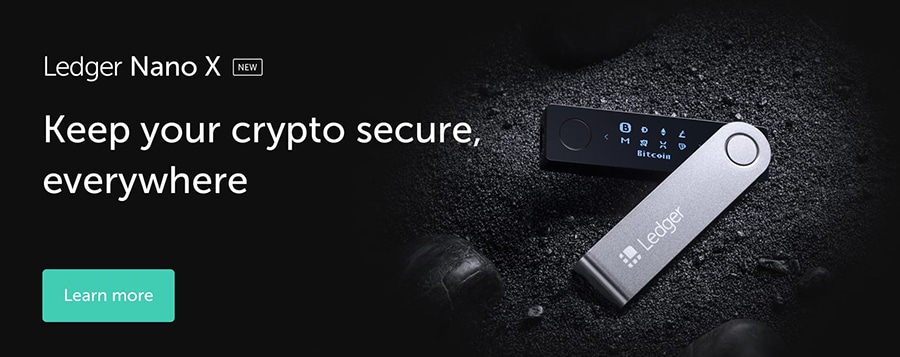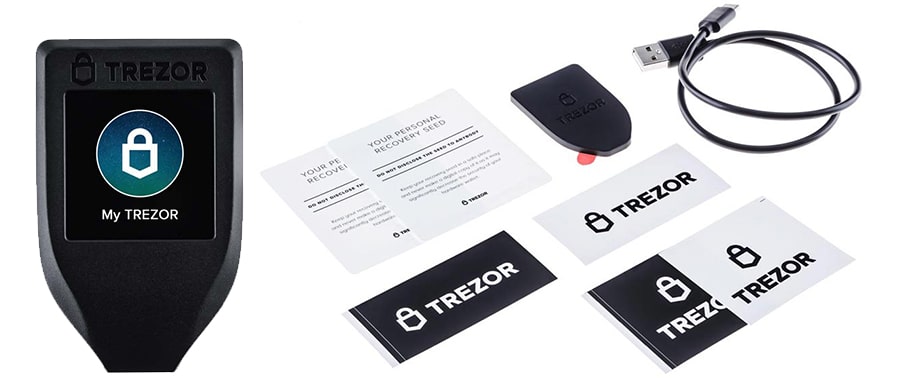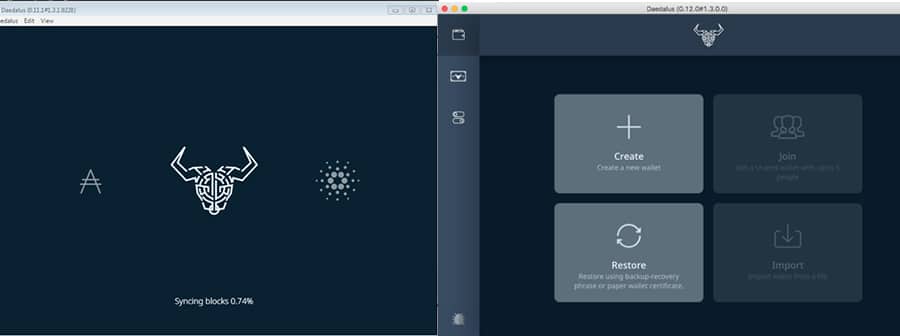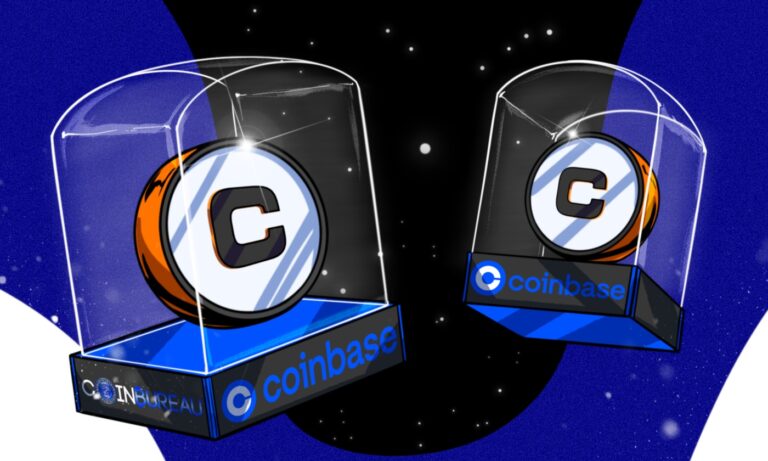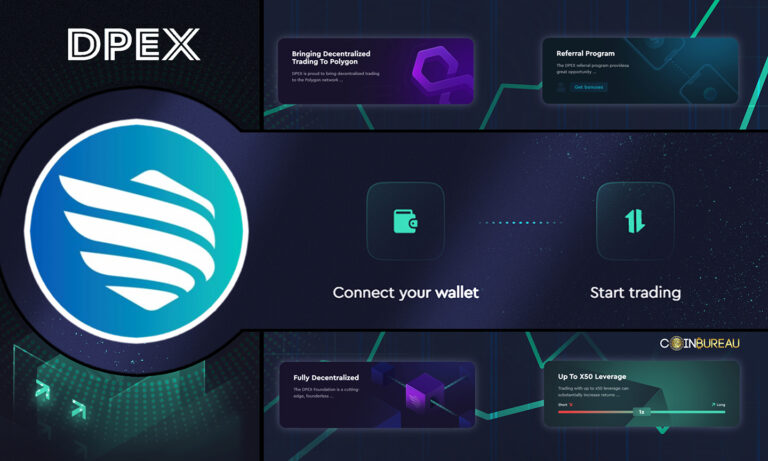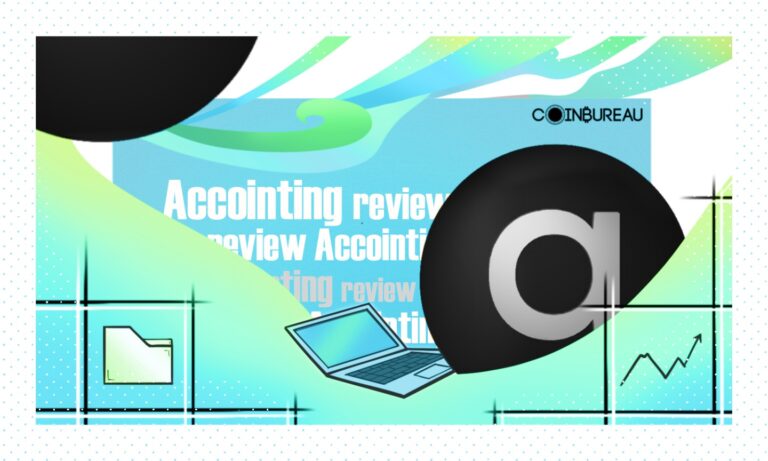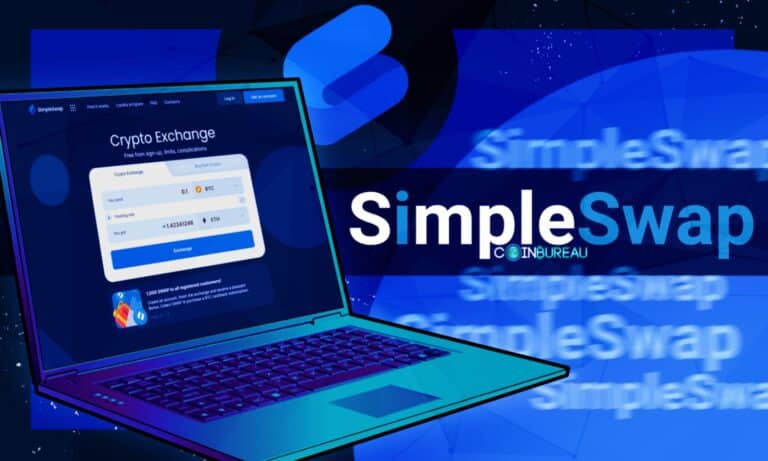Cardano (ADA) is one of the most popular projects currently in the space that is trying to build the next-generation blockchain, often called blockchain v 3.0, or a “Third Generation Blockchain.” With the growing popularity of Cardano, we felt it was time to bring you this article on the Best Cardano Wallets.
Often considered a serious rival to Ethereum, Cardano has the ability to support smart contracts and decentralized applications (dApps). Given this intense interest in the project, Cardano's native ADA is constantly in the top 20 on CMC. If you want to learn more about what makes Cardano so revolutionary, you can learn more about this advanced blockchain network in our Cardano Deep Dive.
As a result of the popularity and interest in this blockchain network, there is a growing need for secure ADA wallets.
In this post, we will be taking a look at the 6 best Cardano wallets and give you some top tips to safely store your ADA. But first, a bit of background information.
Page Contents 👉
- 1 How Cardano Wallet Works
- 2 Best Cardano (ADA) Wallets
- 3 Best Cardano Wallets: Conclusion
- 4 ADA Wallet FAQs
- 4.1 How to find a Cardano staking Pool
- 4.2 Can you Keep Your Cryptocurrencies in Two or More Wallets at a Time?
- 4.3 Can Cardano Hardware Wallets be used to Stake ADA?
- 4.4 Which Cardano Wallets Can be Used With Cardano DApps?
- 4.5 What is the Official Wallet of Cardano?
- 4.6 What is the Safest Way to Store Cardano?
- 4.7 Can I Store Cardano on MetaMask?
- 4.8 Where Should I Store My Cardano ADA?
- 4.9 What Hardware Wallets Support ADA?
- 4.10 Which are the Best Cardano Wallets?
- 4.11 What are the Best Cardano Wallets for NFTs?
How Cardano Wallet Works
The functionality of a Cardano wallet can depend on the type of operating system and device that it is installed on, but the general principle is always the same, and that is that the user retains self-custody over their private keys and responsibility over their crypto.
Regardless of the type of asset being stored in a wallet, a Cardano wallet is a software tool that stores your private keys to the coins that you own. A Cardano wallet will allow you to sign transactions and send or receive ADA from other Cardano wallets or exchanges.
There are various types of Cardano wallets available – Cold wallets/hardware wallets, hot wallets, Cardano desktop wallets & Cardano mobile wallets. There are also Cardano web extension wallets, (most commonly Chrome & Firefox web extensions).
Fun Fact: A very common misunderstanding is that a crypto wallet physically stores your crypto, which is not the case for any wallet. Crypto wallets simply store the private keys needed to track, verify, and interact with your assets that are stored on the blockchain. You can learn more about this in our article on How Crypto Wallets Work.
For simplicity's sake, let's look at the two primary types of crypto wallets: hot wallets and cold wallets.
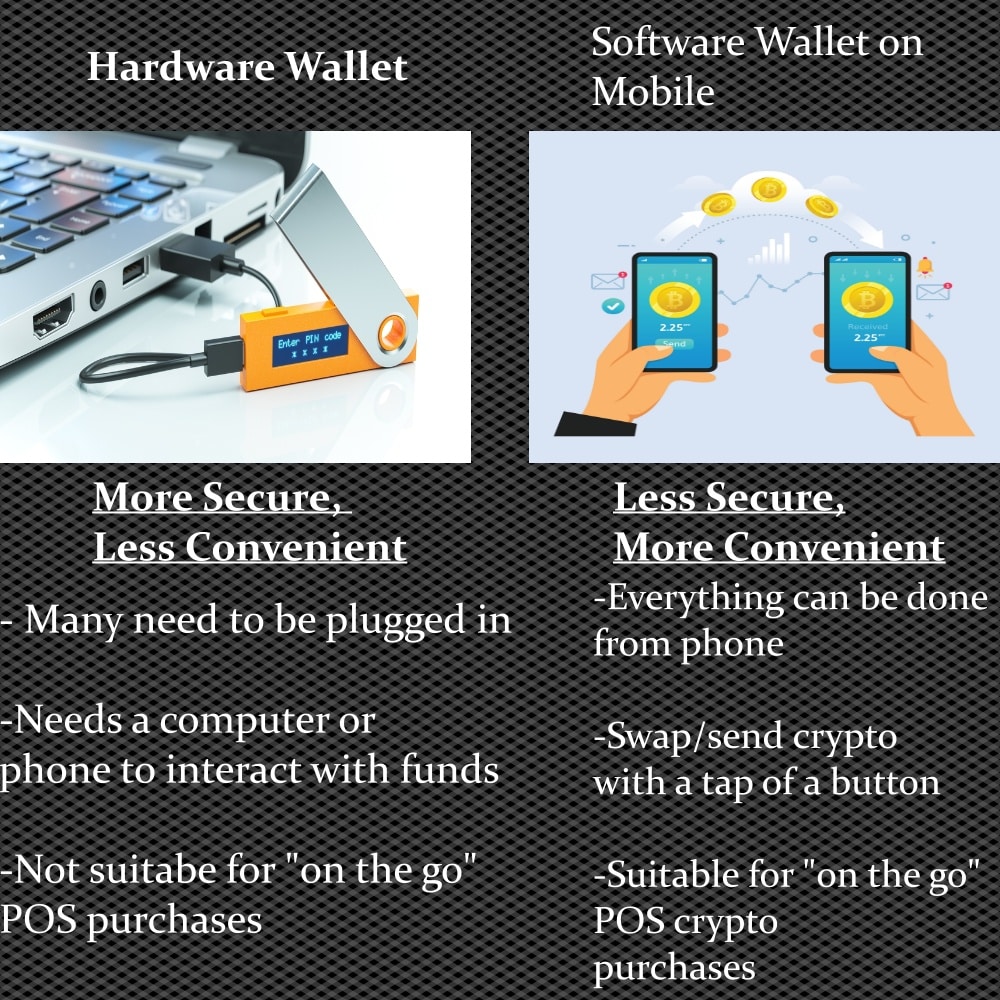
Images via Shutterstock.
Hot wallets are connected to the internet and provide easy access and convenience for users. They include software wallets (such as desktop, mobile, or web applications), and light wallets (such as browser extensions or plugins). Hot wallets are generally used for frequent transactions, holding small amounts of ADA, interacting with DApps and Protocols, or using your crypto on the go.
However, hot wallets are also more vulnerable to security risks, such as hacking, phishing, malware, or human error. Therefore, they should not be used to store large amounts of ADA or long-term savings.
Cold wallets are offline and provide higher security and privacy for users, though they are less convenient as they require more steps to set up, access, backup, or restore. They also often need to be connected to a hot wallet in order to make transactions depending on the DApp or protocol being accessed.
Cold wallets can come in the form of USB devices or smart cards and paper wallets (such as printed QR codes or mnemonic phrases). Cold wallets are suitable for storing large amounts of ADA or long-term savings. The fact that they do not have direct online access means that the user's private keys are kept safely out of the reach of remote attacks.
Regardless of which type of Cardano wallet you choose, you should always follow some best practices to ensure your safety:
- Choose a reputable and reliable wallet provider that supports Cardano. We often recommend Ledger, Trezor, or ELLIPAL, for hardware wallets, and Exodus or Trust Wallet for mobile wallets, and Yoroi, Adalite, and Daedalus for Cardano-specific wallets.
- Backup your wallet regularly and keep your backup data in a safe place
- Use strong passwords and encryption methods
- Enable multi-factor authentication if possible
- Do not share your private keys or mnemonic phrases with anyone
- Do not use public Wi-Fi networks or devices when accessing your wallet
- Update your wallet software regularly
- Beware of scams and phishing attempts
By following these tips, you can enjoy the benefits of using a Cardano wallet without compromising your security.
Best Cardano (ADA) Wallets
Unlike many of the ERC20 tokens and Bitcoin forks, you have less selection with Cardano, but there are still some solid choices. There are a number of open-source and third-party wallets that have stepped up to the plate and integrated ADA.
This selection of the “best Cardano Wallets” is based on a number of factors including security, ease of use, developer support and community support. Another key criterion for us is that we only included wallets that support Cardano Staking and/or delegating. You can learn more about that in our How to Choose a Cardano Staking Pool article. There may be other wallets that we do not mention on this list, so you will have to DYOR on them.
Anyway, with that out of the way, let's get on the top ADA wallets in no particular order.
Ledger Nano (Hardware Wallet)
For the most secure storage of your ADA (or any crypto for that matter), nothing really beats a hardware wallet. This is a device that will keep your private keys in a secure offline environment and will always ensure that even when signing transactions, they are not exposed to hackers/malware.
Ledger is one of the most well-known producers of hardware wallets for cryptocurrencies. The company has been around since 2014 and is based in France. There are three models of Ledger Nano. You have the Ledger Nano S, which is the base model, the Ledger Nano X, which is the advanced model, and then my favourite, the Ledger Nano S Plus as this is pound for pound, one of the best wallets you can get with fantastic asset support at a fraction of the cost of the Nano X.
Each of the three Ledger wallets supports Cardano, and if you want to learn more about the differences between these wallets we have dedicated reviews for all three Ledger wallets that you can find below.
Beware ⚠️: Only buy your Ledger Nano device from the official Ledger store. There is no way of verifying that a third-party seller has not tampered with the device.
One of the best features about Ledger Cardano support is that you can stake your ADA directly in the Ledger devices. You can learn about how to do that in our How to Stake Cardano with Ledger article.
Trezor Model T (Hardware Wallet)
The Trezor Model T is another popular hardware wallet and takes our top pick as the best hardware wallet. It is an upgraded version of the original Trezor Model One. It has support for Cardano’s ADA coin, as well as hundreds of other altcoins. Staking ADA can also be done directly from within Trezor Suite.
Trezor was one of the very first hardware wallets and has been developing hardware wallet solutions for years. Trezor hardware wallets are developed by Satoshi Labs, a company that is based in the Czech Republic.
Like its rival, the Ledger, the Trezor is a small device, similar in size to a flash drive, and it uses a small OLED touchscreen for authorizing transactions, making for easier coin management.
Given that this is a hardware wallet, the private keys are kept on the device and they are never exposed to hackers. The Trezor Model T can connect to online wallets such as Ada lite and other chrome extension wallets via Trezor Bridge, which allows for easy access to the world of DApps and online protocols.
Unfortunately, if you were looking for a cheaper option than the Model T, the entry-level Trezor (Trezor Model One) does not support Cardano ADA.
You can learn more about the Trezor Model T in our dedicated Model T review, or if you want to see how the Model T stacks up against Ledger's Nano X, you may find our Ledger vs Trezor article useful.
Daedalus Wallet (Desktop Wallet)
Daedalus is the official wallet created by Cardano developers. The wallet is a highly secure full node wallet, which has been battle tested and proven, and trusted by the community as an open-source development platform.
Being a full-node desktop client means you need enough space on your PC to download the entire blockchain in order to use the Daedalus wallet, along with enough patience to wait for the blockchain to download and synchronize.
You can run this wallet on the three major desktop operating systems: Windows, Linux and macOS. Staking ADA is also available on the Daedalus wallet.
Open Source 👨💻: One of the main benefits of Daedalus is that it is open source. This means that you can take a look into the source code behind the Daedalus wallet and confirm the robustness of the code. Many in the crypto community believe that the scrutiny from an open-source community means stronger code.
It should also be noted that the Daedalus wallet includes the functionality to create a paper wallet, thus putting your ADA into cold storage easily. We cover how to make a paper wallet with Daedalus in our Daedalus review.
The Daedalus wallet is best for users who want to run a full node to completely remove reliance on others and is often considered a wallet suitable for more advanced users. Using a Daedalus wallet does contribute to the security and decentralization of the Cardano network, so you will find the Daedalus wallet is often the preferred choice for hardcore ADA enthusiasts. You can learn all the ins and outs of the software wallet in our dedicated Daedalus review.
AdaLite Wallet (Web Wallet)
The AdaLite wallet is a lightweight web-based wallet that was previously known as the CardanoLite. It is fast and secure and can be used to access your ADA in several ways. For anyone familiar with the popular MetaMask wallet, AdaLite wallet is like that, but for Cardano.
The AdaLite wallet was created with security in mind of course, but the developers were also aiming to create a wallet that was more user-friendly. Using the AdaLite wallet doesn’t require any downloads, installations, or registrations. Simply point your web browser to the AdaLite URL.
Careful ⚡: Web Wallets are not the safest out there because they are susceptible to phishing attacks by hackers. Hence, you have to make certain that you are visiting the correct URL (https://adalite.io).
When you create a new wallet with AdaLite you will get a 12-word mnemonic phrase. Keep this phrase safe, it is the key to your wallet, and if you lose it you also lose access to all your funds.
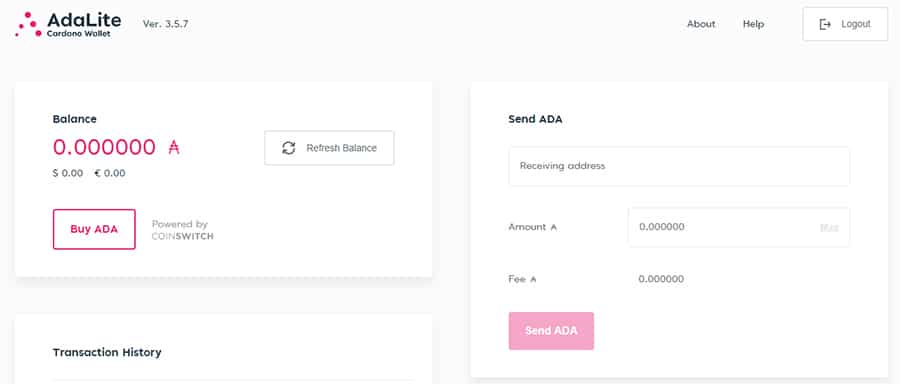
User Interface of the ADALite wallet. Image via Adalite wallet
The reason is that AdaLite is a self-hosted wallet, so your private keys remain only in your possession. Not even the AdaLite website holds any of your data. And there is no backup of your wallet of funds kept there either.
Pro Tip 🤓: Given that Adalite operates solely in the browser and never interacts with a server, you can also use it while disconnected from the internet. This is perhaps also a safer option in case there was ever a situation in which hackers compromised the ADAlite source code. Merely navigate to the website and then disconnect your internet.
Finally, the AdaLite wallet is also compatible with both the Trezor and Ledger hardware wallets, providing users with the security of a hardware wallet, with the convenience of a software wallet, making it so that you can use it to access your funds in many places. Possibly best of all is that unlike the hardware wallets, AdaLite is completely free.
Since the upgrade to the Shelley Network, AdaLite staking is possible through staking pools to earn passive ADA income, you can learn about how to do that in this AdaLite staking guide from Everstake.
Nami Wallet (Web Wallet)
The Nami Wallet supports ADA and Cardano NFTs and has become the favourite cryptocurrency wallet for NFT collectors.
Nami Wallet is a Chrome-based browser extension wallet that supports Cardano. It allows you to store and send both tokens and NFTs, as well as delegate ADA tokens to stake pools for staking purposes. Additionally, it can mint NFTs and interact with smart contracts, and to enhance trust, users can find the open-source code for the wallet on Github.
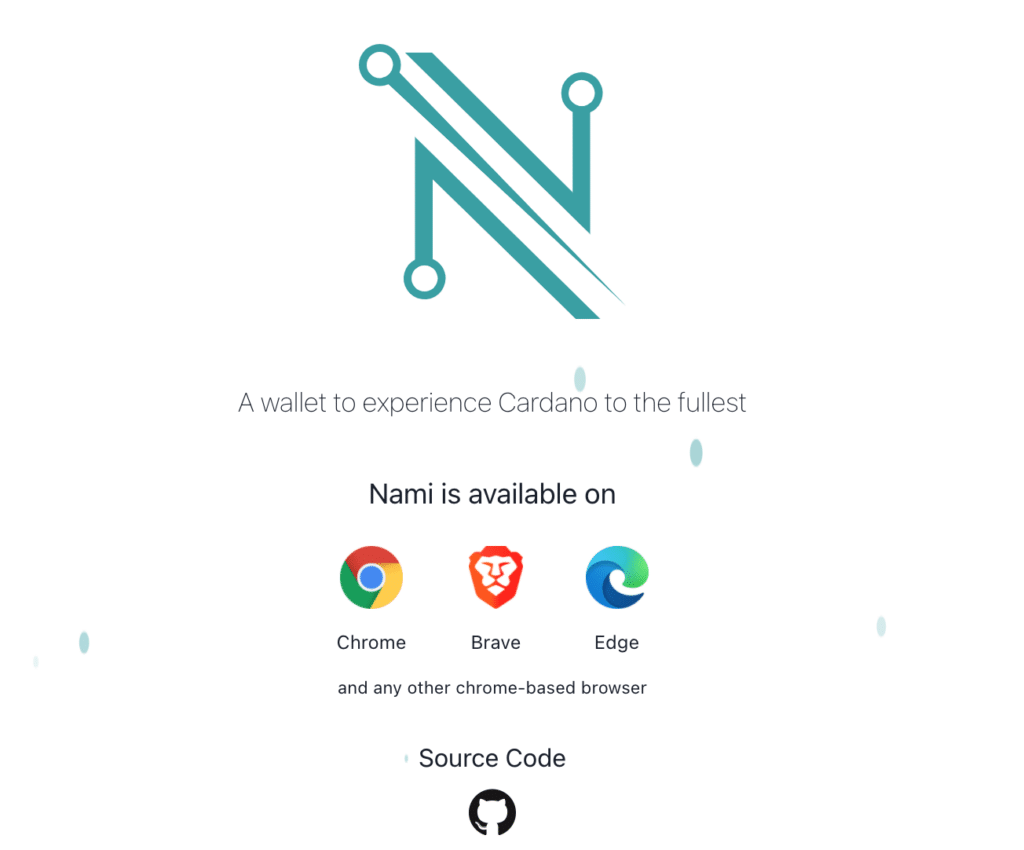
The most no-frills wallet homepage I've ever seen Image via NamiWallet
To make a new wallet, just follow these steps: accept the terms, write down the seed phrase, verify it, create an account and you’re good to go. Be careful not to let anyone see your seed phrase.
Some of the benefits of the Nami wallet include:
- Users can manage assets, delegate to stake pools, mint tokens, use multi-sigs and more.
- Supports smart contracts.
- Works with hardware wallets such as Ledger and Trezor for extra security.
You can find out more about the Nami Wallet, as well as a guide and staking tutorial in our dedicated Nami Wallet review.
Yoroi Wallet (Web and Mobile Wallet)
Last but certainly not least, we have the popular Yoroi Wallet. This is another fantastic free software wallet, available on desktop as a browser extension with fantastic reviews and ratings.
Yoroi is a web browser extension wallet for Cardano (ADA) and its tokens. It is a light wallet, similar to ADA Lite, that connects to Emergo servers to access the Cardano network. It doesn’t need much resources or space on your device. Yoroi can also be downloaded as a Mobile wallet on the app store, making it perfect for users who want to use their Cardano on the go.

A Look at the Yoroi Homepage
The Yoroi wallet can do many things with Cardano and its assets. It is open-source, secure, fast, and easy to use with a nice interface, perfect for accessing the world of Cardano DApps and making quick and simple transactions.
If you are looking to learn more about the Yoroi Wallet, we have a full Yoroi review and a How to use Yoroi Wallet Guide for more info.
Best Cardano Wallets: Conclusion
And there you have it, my list of the top 6 best Cardano wallets where you can store your ADA. If you want the safest option, then you can't beat a hardware wallet. Cardano has really come a long way in recent years, and while wallet support for Cardano used to be pretty limited, there are now fantastic choices for secure ADA storage whether you a choose browser extension wallet, mobile wallet, hardware wallet, or desktop wallet.
Alternatively, if you are looking for a highly functional multi-currency wallet, then you can opt for the Atomic wallet, Trust Wallet, or the Exodus Wallet. And finally, for quick storage of ADA for a long-term hodl, you can always opt for the paper wallet option – simple yet relatively safe (if done correctly).
Of course, irrespective of which wallet you do decide to store your Cardano in, you have to be sure that you are taking the right precautions. Unless you are using a hardware wallet, you need to make sure that your PC or mobile are free of malware and it is a very good idea to install anti-virus software. Always be sure to follow crypto best practices if you are going to self custody any digital asset.
If you are going to opt for the simple Web Wallet like AdaLite or Yoroi, then you need to make sure that you are going to the right site and are not on a phishing page. The best way to do this is to find a link to the right DApp either directly from a source like DApp Radar or the project's official Github or Whitepaper. Once you have the right site, bookmark it to save the extra step in the future.
And of course, with all of these storage options – be careful of who you tell. Nothing can protect you from physical extortion.
Best Places to Buy ADA
ADA Wallet FAQs
How to find a Cardano staking Pool
There are many factors to consider when choosing which Cardano staking pool is right for you, such as fees, saturation, pledge, and even luck. Be sure to check out our full Guide on Cardano Staking to ensure you know the ins and outs before deciding to stake your Cardano.
Can you Keep Your Cryptocurrencies in Two or More Wallets at a Time?
Yes, cryptocurrencies are held on the blockchain, separated and identified by addresses. Each wallet will come with a unique address that will hold an amount of cryptocurrency. Most crypto users will have more than one wallet, a good example of this is that they may hold the majority of their crypto in a hardware wallet for long-term secure storage, and allocate another portion of their funds to a software wallet to use crypto on the go or access DApps and DeFi protocols.
You can think of wallets like bank accounts, just as you can have a savings and chequing account, and keep funds in each, many crypto users will use a hardware wallet like their savings account and a hot wallet like a chequing account.
Can Cardano Hardware Wallets be used to Stake ADA?
Yes, staking can be done directly from both Ledger and Trezor hardware wallets. These hardware wallets can also connect to software wallets like AdaLite to delegate to staking pools that way.
Which Cardano Wallets Can be Used With Cardano DApps?
The most popular wallets for this are the Nami Wallet, CCVault Wallet, Yoroi and AdaLite. As some of these are browser extension wallets or mobile wallets with DApp support built in, these wallets make DApp, NFT, and DeFi access on Cardano easy.
What is the Official Wallet of Cardano?
The Daedalus Wallet is often considered the “official” wallet of Cardano as it was created by the IOG (previously IOHK) team, the same organization that is responsible for much of the development of the Cardano network. Though that does not necessarily mean that it is any more capable or better than the other choices on this list.
What is the Safest Way to Store Cardano?
Hardware wallets such as the Trezor Model T and Ledger hardware wallets are the safest way to store Cardano, as hardware wallets are considered more secure than software wallets. You can learn more about why that is in our Crypto Safety 101 article.
Can I Store Cardano on MetaMask?
No, though Cardano has two primary browser extension wallets that are very similar, which are AdaLite and Yoroi. You could also add the Binance network to MetaMask, and use a Binance Pegged version of Cardano if you want to interact with DApps on the Binance Chain with the value of your Cardano.
Where Should I Store My Cardano ADA?
It is most common for users to store ada safely in a hardware wallet like Trezor or Ledger Nano for long-term storage, and because staking is supported on both devices, it is a good choice. For users looking for long-term storage, but do not have access to a hardware wallet, I would recommend Daedalus if you have the hard drive capacity for it. You can find out how to set up the wallet in our Daedalus guide.
For users who frequently interact with their ADA, both Yoroi and AdaLite are great and convenient choices, though we never recommend exposing large quantities of funds to hot wallets.
What Hardware Wallets Support ADA?
Ledger, Trezor Model T, and ELLIPAL Titan and Titan Mini all support ADA.
Which are the Best Cardano Wallets?
There is no one size fits all answer to what the best Cardano Wallets are, as different wallets have different strengths. My personal pick is the Trezor Model T as the safest Cardano Wallet, while Daedalus is the best for users who want the most decentralized trustless method of storing ada, while running a full node and contributing to the Cardano network.
Yoroi would be my top choice for the best Cardano wallet that can be used as a browser extension, and as the best Cardano Mobile wallet thanks to the functional and highly rated app.
What are the Best Cardano Wallets for NFTs?
Yoroi, Nami, Eternl, Daedalus, Gero Wallet and Typhon wallet are the primary Cardano wallets capable of Cardano NFT support.


